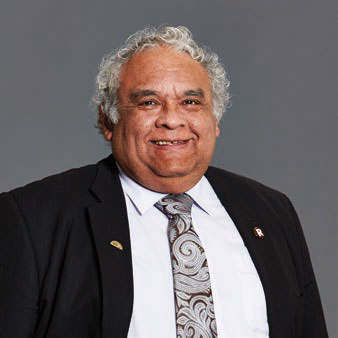
Professor Tom Calma AO
ALUMNI AWARDS RECIPIENT
Chancellor, University of Canberra
National Coordinator, Tackling Indigenous Smoking
Co-chair, Reconciliation Australia
Associate Diploma of Community Development
Associate Diploma of Social Work
It would be simplistic to say that Professor Calma is a human rights and social justice campaigner, for he is so much more than that. Although justice and human rights are at the centre of his being, Professor Calma is a respected Aboriginal Elder who has, for over 40 years, worked at a local, community, state and international level championing the rights, responsibilities and welfare of Aboriginal and Torres Strait Islander peoples.
Taking advantage of a sponsorship opportunity offered by his employer, the Department of Housing and Construction, young Tom Calma travelled from his home in Darwin to study an Associate Diploma of Social Work at the South Australian Institute for Technology, one of UniSA’s antecedent institutions. Upon graduating in 1978 he led the creation of and became a lecturer in the Aboriginal Task Force program at the Darwin Community College in 1979-80, and began devoting his considerable talents and energies to improving and extending the lives of his people, caring as deeply for individuals as he does for the community.
It was his father, also called Tom, who inspired Professor Calma’s life work.
‘He was an inspiration,’ says Professor Calma. ‘He passed away the year following my graduation so that stopped me from undertaking further studies. But my father, from a single parent family, educated himself throughout his working life; he studied for examinations to move up through the ranks working on road construction. He started with patching roads, became a truck driver, a foreman and then supervisor of road building works. After Cyclone Tracy devastated Darwin in 1974 he was put in charge of cleaning up the mess. And then, at the prime of his life, he died of cancer in 1979 at the age of 55.’
Tom Calma Senior would be just as proud of Professor Tom Calma as we are.
Through his 2005 Social Justice Report, Professor Calma called for the life expectancy gap between Indigenous and non-Indigenous peoples to be closed within a generation. He advocated embedding a social determinants philosophy into public policy around health, education and employment in order to address Indigenous equality gaps. This spawned the Close the Gap for Indigenous Health Equality Campaign that brought national attention to achieving health equality for Indigenous peoples by 2030.
Professor Calma is also a strong advocate for Indigenous rights and empowerment and, in addition to the Closing the Gap Campaign, has been instrumental in the establishment of the National Congress of Australia’s First Peoples, development of the inaugural National Aboriginal and Torres Strait Islander Suicide Prevention Strategy, and the promotion of Justice Reinvestment.
His many awards include the Order of Australia in 2012 for distinguished service to the Aboriginal community and being named ACT Australian of the Year in 2013. He holds an Honorary Doctorate of Letters from Charles Darwin University, and is an Honorary Doctor of Science from Curtin University and an Honorary Doctor of the University at Flinders. He was Chair of the External Review Panel of the David Unaipon College of Indigenous Education
and Research at the University of South Australia and is a member of numerous national boards and committees, including the Indigenous Research Ethics Guidelines Review Working Committee of the National Health and Medical Research Council and chair of the Cooperative Research Centre for Remote Economic Participation. In January 2015 he was appointed a professor at the University of Sydney Medical School as Chair and Patron of the Poche Indigenous Health Network.
Now Chancellor of the University of Canberra, he was the first Aboriginal or Torres Strait Islander man in one hundred and sixty four years to hold the position of Chancellor of any Australian university.
Professor Calma proudly boasts that he met his wife of thirty eight years at SAIT and that two of his three children have degrees, while the third is working towards completing one. According to Professor Calma, whose extended family history has endured lots of social and economic challenges, it is education that is now advancing Aboriginal and Torres Strait Islander peoples in more meaningful ways.


